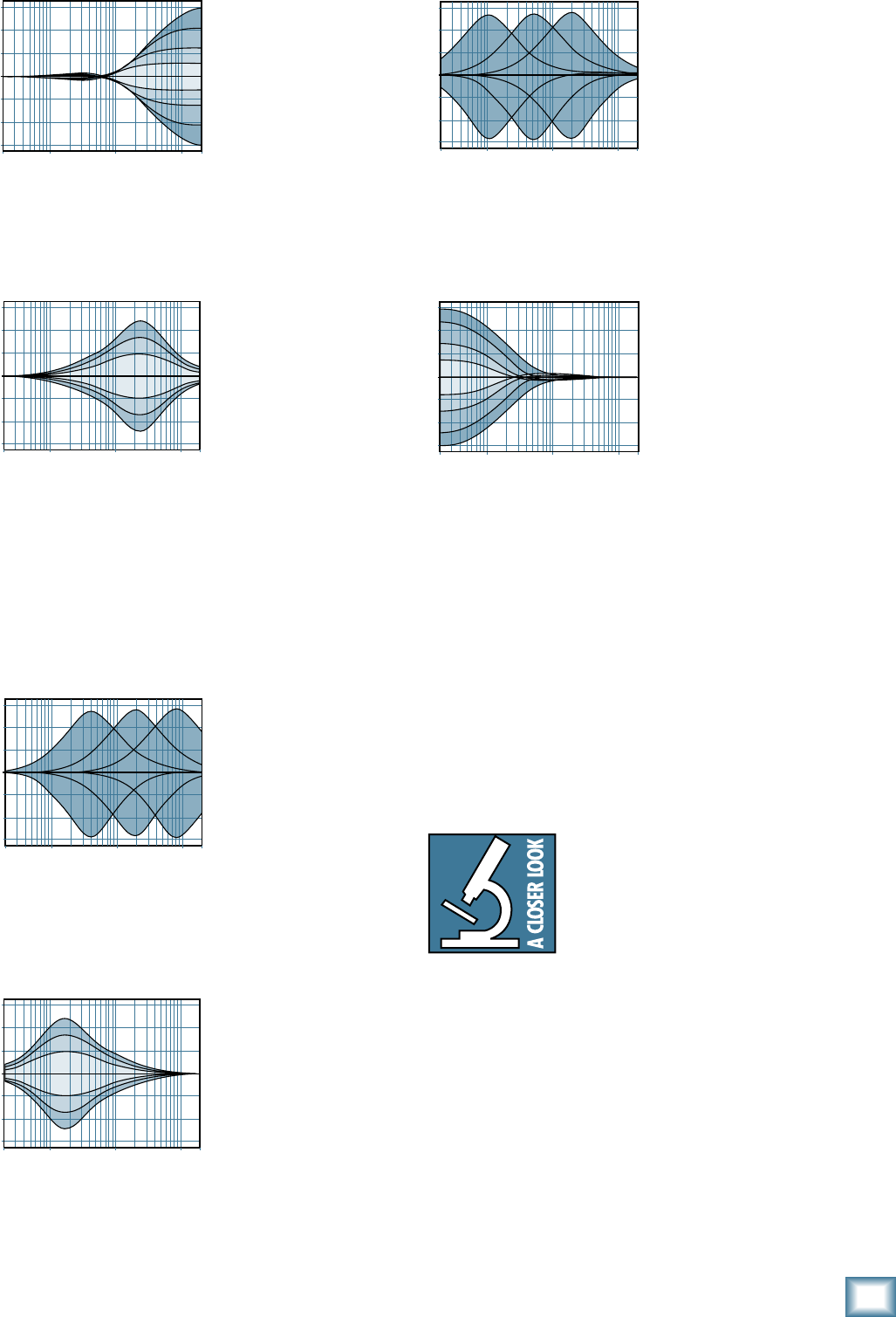
11
Owner’s Manual
Owner’s Manual
5. HIGH EQ
This control gives you
up to 15 dB boost or cut at
12 kHz, and is flat at the
center detent. Use it to
add sizzle to cymbals, and
an overall sense of trans-
parency or edge to the
keyboards, vocals, guitar,
and bacon frying. Turn it
down a little to reduce sibilance, or to hide tape hiss.
6. HIGH MID EQ
Short for “midrange,”
this knob provides 15 dB
of boost or cut centered
at the frequency deter-
mined by its FREQ knob
(see HIGH MID FREQ
next). Midrange EQ is
often thought of as the
most dynamic because
the frequencies that define any particular sound are
almost always found in this range. The HIGH MID EQ
range (400 Hz to 8 kHz) includes the female vocal range
as well as the fundamentals and harmonics for many
instruments.
7. HIGH MID FREQ
This knob ranges from
400 Hz to 8 kHz and
determines the center
frequency for the HIGH
MID EQ filter. This allows
you to zero in on the
precise narrow band of
frequencies you want
to have affected by the
HIGH MID EQ.
8. LOW MID EQ
This is a second mid-
range EQ control that
provides 15 dB of boost
or cut centered at the
frequency determined by
its FREQ knob. It extends
down to 100 Hz, which
includes the male vocal
range and the fundamen-
tals of some lower instruments (guitar, lower brass).
. LOW MID FREQ
This knob ranges from
100 Hz to 2 kHz and
determines the center
frequency for the LOW
MID EQ filter. This allows
you to zero in on the
precise narrow band of
frequencies you want to
have affected by the LOW
MID EQ.
10. LOW EQ
This control gives you
up to 15 dB of boost or cut
at 80 Hz. The circuit is flat
(no boost or cut) at the
center detent position.
This frequency represents
the punch in bass drums,
bass guitar, fat synth
patches, and some really
serious male singers.
Note: Used in conjunction with the Low Cut switch,
you can boost the LOW EQ without injecting tons of
infrasonic debris into the mix.
11. EQ IN/OUT Switch
This is a true hardware bypass of the Perkins EQ cir-
cuitry to insure that there is no coloration of the signal
if the EQ is not needed. When this button is out, the EQ
controls have no effect on the signal. You can use this
switch to make an A/B comparison between the EQ’d
signal and the signal without EQ.
We have completely redesigned the
EQ circuits in the Onyx Series of
mixers, based on the designs of Cal
Perkins, an industry-leader in audio
engineering for over three decades
and long-time Mackie collaborator.
This “neo-classic” design provides the sweet musicality
of the British EQ
sound, while still maintaining 15 dB of
boost and cut with optimum Q
and minimum phase shift
(in other words, it gives you plenty of control and is
pleasing to the ear!).
The 4-band equalization has LOW shelving at 80 Hz,
LOW MID peaking, sweepable from 100 Hz to 2 kHz on
the mono channels, HIGH MID peaking, sweepable from
400 Hz to 8 kHz on the mono channels,
and HIGH shelv-
ing at 12 kHz. “Shelving” means that the circuitry boosts
or cuts all frequencies past the specified frequency. For
example, rotating the LOW EQ knob 15 dB to the right
boosts bass frequencies below 80 Hz and
continuing on
20
Hz
100
Hz
1k
Hz
10k
Hz
20k
Hz
–15
–10
–5
0
+5
+10
+15
High EQ
20
Hz
100
Hz
1k
Hz
10k
Hz
20k
Hz
–15
–10
–5
0
+5
+10
+15
High Mid EQ
20
Hz
100
Hz
1k
Hz
10k
Hz
20k
Hz
–15
–10
–5
0
+5
+10
+15
Low EQ
(Z (Z K(Z K(Z K(Z
n
n
n
Low Mid EQ Freq Sweep
20
Hz
100
Hz
1k
Hz
10k
Hz
20k
Hz
–15
–10
–5
0
+5
+10
+15
Low Mid EQ
(Z (Z K(Z K(Z K(Z
n
n
n
High Mid EQ Freq Sweep


















